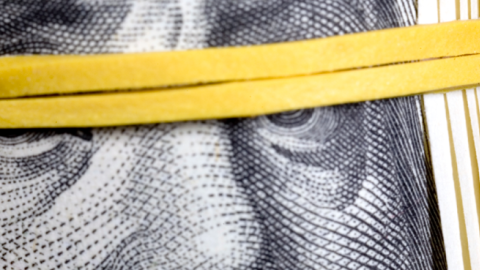**In the most comprehensive kleptocracy policy study yet published, Nate Sibley and Ben Judah examine the pervasive threat to democracy, prosperity and security posed by globalized corruption and offer 70 recommendations for US policymakers.**
__“The danger of countries that have fallen to authoritarian kleptocrats is real, and the danger extends beyond the country’s borders. Indeed, most of the threats our rule-of-law world faces emerge from countries operating without rule of law that are sinks of corruption, autocracy and lawlessness.” - Senator Sheldon Whitehouse, Preface__
Kleptocracy, or “rule by thieves,” has for too long been disregarded from mainstream foreign policy discussions. It is often overlooked as a peripheral economic development issue: A problem for tax justice advocates and foreign aid workers. Yet it has been shaping international politics and the global security environment for decades. The Biden-Harris administration will have an unprecedented opportunity—and a unique responsibility—to confront this pervasive threat with decisive action.
This chance comes not come a moment too soon. Since the end of the Cold War, corruption has metastasized beyond national borders into a problem of almost unimaginable scale. The United Nations has estimated that $1 trillion are paid in bribes and a further $2.3 trillion otherwise stolen annually.1 Global Financial Integrity, a Washington-based think tank, cites corruption as a key factor in $8.7 trillion that vanished from official records of trade between 135 developing countries and 36 advanced economies from 2008-2017.2
Kleptocracy is a blight on international development, governance and democracy, vastly worsening conditions for populations worldwide. The International Monetary Fund has calculated that global tax revenues would increase by more than $1 trillion annually if all countries collected taxes as efficiently as those with the least corrupt governments, providing nearly twice the revenue needed to meet the UN’s Sustainable Development Goals.3 4
These figures show that corruption is now a key feature of financial globalization. Yet they are so vast as to run the risk of obscuring the human reality of life and death in societies where the state has been robbed of its capacity to provide security and other basic needs. The true cost of kleptocracy cannot be counted in dollars, but in billions of lives that have been ruined or lost through famine, violence, abuse, and despair. It has been estimated that 3.6 million people a year die from corruptioninduced causes, concentrated in the world’s most vulnerable economies and poorest populations.5 The time for action is now.
Beyond strictly humanitarian concerns, it is no coincidence that the world’s most corrupt leaders also continually undermine global security. Authoritarianism and corruption have melded into a single pervasive threat. Ruling elites in China, Iran, North Korea, Russia, Venezuela and other authoritarian regimes are the most prolific abusers of the global financial system, fusing opportunities for illicit self-enrichment with malign geopolitical ambitions. Their corrupt officials are routinely implicated in bribery, sanctions evasion, IP and technology theft, financing of terrorism and other criminal activities. These are the foreign policy tools that inevitably emerge from domestic political systems shaped by, and sustained through, endemic kleptocracy. Corruption is used in all such regimes simultaneously as a tool of repression, to entrench and expand the regime, and to project power beyond national borders.
Therefore, as Senator Sheldon Whitehouse and General David Petraeus observed in 2019, “the fight against corruption is more than a legal and moral issue; it has become a strategic one — and a battleground in a great power competition… Complacency about graft and kleptocracy beyond US borders risks complicity in it — with grave consequences both for the nation’s reputation abroad and Americans’ well-being at home.6
In fact, “following the money” from overseas corruption cases has often led American experts uncomfortably close to home. All too often, it is unwitting or unscrupulous Western professional services providers who launder, conceal, and claim lucrative commissions from funds derived from transnational crime and corruption. This is not a case of “bad apples” but a structural problem. The kleptocracy that afflicts developing countries and powers authoritarian regimes is not only facilitated but incentivized by offshore tax havens and poorly-regulated major financial centers, some of the most significant of which are located within the United States itself. In this way, the proceeds of kleptocracy find their way into democratic societies as well, with an increasingly corrosive effect on their own political, legal, and financial institutions.
President-elect Biden will assume office amid a sea change in attitudes towards corruption. Despite the secrecy surrounding the murky world of transnational kleptocracy, there is now growing public awareness of how it works in practice. In 2016, the Panama Papers - a leak of 11.5 million documents from offshore law firm Mossack Fonseca - offered an unprecedented glimpse into the methods used by political elites to move unexplained wealth worldwide. Thanks to a new collaborative model of investigative journalism, similar leaks are emerging with astonishing frequency, notably the Paradise Papers in 2017 and the Luanda Leaks in early 2020. Most recently, the FinCEN Files highlighted the problematic relationship between financial institutions responsible for reporting suspicious financial activity and the under-resourced government agency tasked with analyzing the data. The harmful effects of transnational corruption have also been illustrated by a string of high-profile criminal cases in recent years. These include Malaysia’s 1MDB scandal, the prosecutions of various high-level Venezuelan officials, and ongoing inquiries into alleged money laundering by Ukrainian oligarch Ihor Kolomoisky. Most obviously, the Special Counsel investigation of Russian interference in the 2016 US presidential election had the effect of opening many Americans’ eyes to financial entanglements between their own political elites and those of some of the most corrupt countries on Earth.
This changing perception of transnational corruption reflects the acute strategic challenge facing the next administration. Kleptocracy continues to devastate the developing world while fueling almost every major threat to global security, poisoning international markets, and undermining democracy. This problem is far more serious and pervasive than the caricatures of Cold War despots hoarding gold bullion, or even Russian “oligarchs” enjoying the high life in London, would tend to suggest. Ultimately, countering global kleptocracy is not a matter of targeting isolated instances of corruption around the world, but winning a competition to shape the global economy in the 21st century. Tackling global corruption is not a distraction from dealing with China, Russia and other strategic competitors, but central to it.
Every so often, a major threat or crisis compels the US government to examine systemic vulnerabilities in its own financial system. In the last decades of the 20th century, the War on Drugs resulted in new legal authorities and unprecedented resources for law enforcement to target the financial proceeds of crime. The terrorist attacks of September 11, 2001 likewise resulted in sweeping new powers with which US intelligence and law enforcement agencies could pursue the funders of terrorism through an increasingly sophisticated global financial system. We face no less a challenge now, in the shape of an adversarial China intent on reshaping the global order to its own ends, a hostile Russia bent on sowing discord within its perceived enemies’ ranks, and the broader upheavals of ongoing geopolitical realignment. Kleptocracy has fueled these developments, yet efforts to upgrade America’s financial defenses and tools of economic statecraft have only just begun.
The United States’ approach to transnational corruption and other forms of illicit finance has not always fallen behind the curve. In 1977, America became the first country to ban its own companies from bribing foreign officials through the landmark Foreign Corrupt Practices Act. In 1986, it became the first country to criminalize money laundering at the federal level. In 2010, it launched a dedicated interagency Kleptocracy Asset Recovery Initiative. And in 2016, it became the first country to introduce sanctions targeting human rights abuses and corruption in the form of the Global Magnitsky Act. Working multilaterally, the US played a leading role in launching the Financial Action Task Force (1989), as well as shaping the OECD Anti-Bribery Convention (1997), the UN Convention Against Corruption (2003), and other important international agreements. President George W. Bush introduced a National Strategy to Internationalize Efforts Against Kleptocracy as early as 2006, while President Barack Obama launched a US Global Anticorruption Agenda in 2014. These and many other examples show that, more than any other country, the United States can innovate, adapt, and lead the rest of the world in beating back kleptocracy if it so chooses.
Indeed, America has a unique capacity and special responsibility to take on kleptocracy and other forms of illicit finance. This is because the United States alone bears the “exorbitant privilege” of economic hegemony while overseeing the global reserve currency. This gives the US government tremendous political leverage worldwide and means that even seemingly minor regulatory measures enacted in Washington, DC can send shockwaves through the entire global financial system.
The Biden-Harris administration should use this power to trigger another transformational moment in America’s decades-long struggle against corruption. Encouragingly, the President-elect has in fact already committed to doing so. In a March 2020 Foreign Affairs article, he outlined plans for a multilateral Summit for Democracy that would put countering global kleptocracy at the heart of US foreign policy:
“...the United States will prioritize results by galvanizing significant new country commitments in three areas: fighting corruption, defending against authoritarianism, and advancing human rights in their own nations and abroad. As a summit commitment of the United States, I will issue a presidential policy directive that establishes combating corruption as a core national security interest and democratic responsibility, and I will lead efforts internationally to bring transparency to the global financial system, go after illicit tax havens, seize stolen assets, and make it more difficult for leaders who steal from their people to hide behind anonymous front companies.”7
President-elect Biden has also committed to addressing domestic vulnerabilities to malign foreign influence:
“I will propose a law to strengthen prohibitions on foreign nationals or governments trying to influence US federal, state, or local elections and direct a new independent agency—the Commission on Federal Ethics—to ensure vigorous and unified enforcement of this and other anticorruption laws. The lack of transparency in our campaign finance system, combined with extensive foreign money laundering, creates a significant vulnerability. We need to close the loopholes that corrupt our democracy.”8
Strange as this central focus on corruption may sound to the US foreign policy establishment, it is by now hardly a radical agenda – or even a partisan one. Many people will remember the 116th Congress as one of the most divided in living memory, but advancing an unprecedented raft of anti-kleptocracy legislation was one of the few areas in which lawmakers from both sides of the aisle felt strongly enough to put aside their differences. It was a process in which the US Helsinki Commission, with its decades-long mission to fostering bipartisan cooperation on human rights, security and economic issues, played a leading role. This momentum culminated in the passage of the Anti-Money Laundering Act of 2020 (as an amendment to the National Defense Authorization Act), which mandates the most significant upgrades to America’s financial defenses in nearly two decades. President-elect Biden’s commitment, combined with ongoing congressional efforts, reflects a key area of bipartisan understanding in which it should be possible to expedite domestic reforms that end America’s current status as a magnet for dirty money.
The Biden administration can then take this agenda overseas by making countering kleptocracy a central pillar of US foreign policy and of the planned Summit for Democracy. Among democratic partners the United States needs a clear diplomatic agenda, regrouping allies in the G7, OECD and NATO to pass their own bold reforms against illicit finance. This can only be achieved by working closely with like-minded partners such as the European Union, the Five Eyes countries, and strategic allies such as Japan and India. Renewed American influence and leadership can then be leveraged through other multilateral organizations and institutions such as the G-20, World Bank, International Monetary Fund and Financial Action Task Force to pressure corrupt regimes.
Taking on kleptocracy also offers a way for the United States to distinguish itself from strategic rivals, especially the Chinese Communist Party and its disingenuous anti-corruption campaign. At some point in 2021, the United Nations General Assembly will hold a once-in-a-generation Special Session on corruption that could set the international agenda for decades to come.9 As China and Russia’s leaders work to seize key anticorruption institutions and build a new global consensus that shields them from accountability, a US platform that consists of past victories, a decent enforcement record, and delayed reforms will not be good enough. A bold international agenda against corruption, by contrast, will represent a renewed statement of values and the message that the “swing states” of the international order need to hear.
This paper provides a policy blueprint for achieving what the US now urgently needs: A comprehensive strategy for confronting authoritarian corruption and countering global kleptocracy. The first section sets out domestic reforms needed to defend America’s financial system. The second section outlines measures to target corruption overseas, while the third proposes initiatives to renew US global leadership against kleptocracy. In the final section, we set out a sequential checklist containing 70 policy recommendations for both the Executive Branch and Congress.
These proposals will enable the United States to assert new global standards and lead initiatives that can unite democratic allies in a common cause, bring billions of people closer to the promise of democracy, and gradually transform the global economy into a hostile environment for authoritarian kleptocrats who seek to abuse it. It is a task on which America’s own democracy, security and prosperity ultimately depends.
We are grateful for the support of the Smith Richardson Foundation in compiling this paper; and to the many leading experts who imparted their time and insights during our research, including many former and serving US officials. Any errors are, of course, our own. We do not endorse any specific legislation, but have cited relevant bills for ease of reference and to illustrate the growing momentum behind US anti-kleptocracy efforts. We hope the following report will help in its own small way.
















